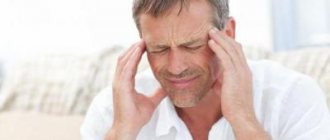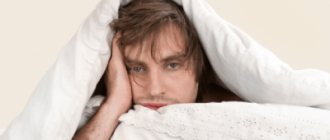If you suffer from anxiety and frequently experience stressful situations, you are definitely not alone. According to statistics, about 18% of people annually seek help from psychologists with complaints of increased anxiety and emotional discomfort.
Meanwhile, constant stress and lingering feelings of anxiety are a common form of mental disorder. And the longer a person is depressed, the more he risks “overloading” his psyche and encountering diseases that are much more dangerous to human health: such as depression or an anxious personality disorder.
Despite the fact that feelings of anxiety and restlessness accompany every adult from time to time, it is not customary to talk openly about such manifestations. For some reason, it is believed that excessive emotionality is a sign of weakness. And appearing weak or overly sentimental in the modern world is not fashionable. And if anxiety is a normal protective reaction of the body in response to external circumstances, then anxiety disorder is a serious diagnosis that entails negative behavioral and emotional consequences. And although worry does not always lead to an anxiety disorder, it is still better to be savvy in matters of your health and know the main physical symptoms of anxiety that should not be ignored.
Main reasons
Physiological
Sleep is a complex physiological process that can easily be influenced by external factors:
- too bright room lighting (lantern by the window, loose curtains);
- working electrical appliances with indicator lights;
- lack of oxygen, including that caused by an excess of indoor plants;
- high temperature and low humidity;
- external sound stimuli (car noise, neighbor snoring, etc.);
- uncomfortable bed and poor quality bedding;
- menstruation - many women are afraid to dirty the bed and therefore sleep poorly or wake up early;
- pregnancy – a large belly causes discomfort to the expectant mother, and the child’s activity interferes with sleep;
- overeating before bed, very fatty or heavy food for the stomach;
- snoring – snorers create sleep problems not only for others, but also for themselves;
- long hair - it is better to braid it in loose braids so as not to get tangled and interfere with sleep.
Pathological
Pathological causes include acute and chronic diseases of internal organs and systems.
If waking up early is accompanied by symptoms such as rapid heartbeat, headache, difficulty breathing, heartburn, back or joint pain, burning and pain in the heart area - asking why I wake up at 5 am, it is better to consult a doctor. He will prescribe the necessary tests and, based on their results, make a diagnosis. Most often, systematic early awakenings are symptoms of:
- coronary heart disease;
- bronchial asthma;
- reflux disease;
- arthritis or arthrosis;
- multiple sclerosis;
- Parkinson's disease;
- spinal cord lesions;
- brain tumors.
The ability to quickly cure these diseases directly depends on early diagnosis. Therefore, it is better not to delay your visit to the doctor.
Psychological
Very often, people begin to wake up early in the morning in a state of severe or constant stress. If you do nothing about it, then neurosis and depression gradually develop. The quality of sleep will rapidly deteriorate, and due to chronic lack of sleep, performance will decrease and problems at work will begin.
Waking up at 4-5 o'clock in the morning is often provoked by vegetative-vascular dystonia, the constant companions of which are anxiety that appears for no reason, panic attacks, sudden jumps in blood pressure, tachycardia, and fear of death. This disease at an early stage responds well to treatment with folk remedies and mild sedatives.
Insomnia due to nervousness often occurs in pregnant women and during menopause. Not only is it caused by hormonal changes at this time, but subjective fears are also added.
Pregnant women are afraid of the upcoming birth, mature women are afraid of approaching old age. In this case, you may need the help of a good psychotherapist. Breathing exercises, massage, and meditation are also useful.
Anxiety, fear, panic attacks. Treatment of phobias and fears, combating panic attacks
Panic attacks. Treatment.
Some patients complain of an altered perception of the world (the world seems to lose color), and panic attacks. Panic fear occurs spontaneously, often in a crowded place (shop, train, subway, bus, elevator), but patients tend to discuss not the attack itself, but its consequences, for example, deterioration in general condition, without presenting specific complaints. On the other hand, when asked directly, the patient usually confirms that at that moment he felt a strong heartbeat, lack of air, sweating, weakness in the legs, abdominal cramps, chest pain, tremor, trembling. Often patients distinguish between dizziness and lightheadedness, and in some cases they cannot describe their condition at all. Depersonalization and derealization (feelings of the world around you being unreal or alienated from yourself) are typical symptoms of panic disorder and only make the panic attack worse. In addition to these somatic symptoms, patients may describe a state close to panic. Usually they have a feeling of approaching danger, confusion and powerlessness to the point of fainting. Patients think they are having a myocardial infarction or stroke and ask to be taken to the nearest emergency room. Describing the onset of an attack, the patient reports a “blow” to the head or heart, a feeling of shock, a beating throughout the body, a rush of blood to the head, an increase in blood pressure, etc. During an objective study, changes are recorded much less frequently. Daily monitoring of heart rate and blood pressure showed that their average daily values do not differ from those of healthy people. Significant fluctuations are observed during periods of “panic attack” or its anxious anticipation: in 30% of patients, subjective sensations were accompanied by an increase in blood pressure and heart rate - in 60% of patients, in 20% there were no objective changes at all. Along with typical symptoms, there may be others - atypical, not included in the criteria for a panic attack: local pain (in the head, abdomen, spine), numbness, burning sensation, vomiting, “lump” in the throat, weakness in the arm or leg, gait disturbance , vision, hearing. In some patients, there is no anxiety at all - “panic without panic” occurs. During the interictal period, the vast majority of patients experience autonomic dysfunction of varying degrees of severity - from minimal, when patients feel practically healthy, to maximum, when the border between an attack and the interictal period is blurred due to the strong severity of disorders between PA (panic attacks). Clinical manifestations of autonomic dysfunction in the interictal period are characterized by polysystemicity, dynamism and other signs characteristic of autonomic dysfunction syndrome. Most often, the character of vegetative-vascular dystonia is flexible: a little effort on your part and it will leave you alone. Well, if you don’t pay attention to the alarm bells, the disease can rage like a river overflowing its banks. Such storms, which shake the body in 5 minutes or at most several hours, are called vegetative-vascular crises by doctors. They occur more often in females during menstruation, especially if menopause coincides with unfavorable weather or a major showdown, as well as in women who have entered menopause. They need to protect their peace of mind with redoubled force. The close connection between vegetative crises and emotional shocks has been known since the time of Chekhov: in such cases, his colleagues said that the patient had a panic attack, and to combat panic attacks it is necessary to prescribe the strictest rest. Sympathetic-adrenal crises are most susceptible to people of the sympathetic type. Usually, in the late afternoon or at night, headaches intensify, stabbing, constricting, pressing and driven heart beats (pulse - up to 140 beats per minute, pounding in the temples, blood pressure rises to 150/90-180/110 mm Hg, there is not enough air - every breath is difficult, you feel chills, your arms and legs go numb, your body becomes covered with goose bumps, the temperature rises to 38-39°C, you always want to urinate in the toilet). And although there is not the slightest threat to life in this case, there is such a fear of death that it is not difficult to lose your head, rushing around the apartment in indescribable excitement. Stop! Pull yourself together! By coping with panic, you will already help yourself. Open a window, unbutton your shirt, loosen your collar, loosen your belt, sit in a comfortable chair or lie down in bed with a few tall pillows tucked under your back to help you breathe easier. Apply napkins or a towel moistened with cold water to your forehead, temples, neck and wrists. Slowly drink a glass of cold boiled water, focusing on your sensations. To calm your heartbeat, close your eyes and press 10 times with the pads of the middle and index fingers of both hands on your eyeballs 3 times within a minute. Massage the point in the center of the chin with circular movements of the index finger of both hands (9 times clockwise and the same number against it). Squeeze, knead and slightly stretch your middle finger for 2-3 minutes on each hand. Take 30 (for strong heartbeat - 40-45) drops of Valocordin or Corvalol in a small amount of water, or 20 lily of the valley-valerian or lily of the valley-motherwort drops, a no-shpa tablet and then wait 10-15 minutes. Isn't it better? Vagoinsular crises often cause anxiety in people of the parasympathetic type. Troubles usually happen in the morning and during the day - in the evening you don’t have to worry about your well-being. Weakness, a feeling of heat and heaviness appear in the head, it begins to spin, blood rushes to the face, there is a feeling of suffocation, nausea, and sometimes abdominal pain and diarrhea, “throws” into sweat, the heart stops, the pulse becomes rare (up to 45 beats). /min), blood pressure drops to 80/50-90/60 mmHg. Art., in a word, it seems that the soul is parting with the body, and such a panic takes over, even if you run to the ends of the world, but you just don’t have the strength. To calm down, take 1-3 tablets of bellataminal or bellaspon (cannot be used during pregnancy) or 20 drops of novopassit or valerian tincture, open the window and go to bed without a pillow, placing your feet on a blanket folded several times: with low pressure, the brain experiences oxygen starvation , and the horizontal position will ensure blood flow to the head. Brew strong sweet tea or prepare a cup of black coffee with sugar. Has there been any relief? Call a doctor! When treating panic attacks, you need to master the art of balancing in order to skillfully balance the scales of the autonomic nervous system. And she “loves” stability and order in everything. • Schedule your day by the hour: getting up, exercise, breakfast, work time, lunch, rest, favorite TV series, household chores, dinner, evening walk - try, if possible, not to deviate from this schedule. • Move more and spend at least 2 hours a day in the fresh air. Don't have time for this? Start small - use transport less often and walk more often. Encourage yourself to jog or visit the pool twice a week, and on weekends - a bathhouse: swimming and hardening water procedures will maintain “balance” in the autonomic nervous system. • Massage your fingers. By taking turns squeezing, kneading and slightly stretching them for several minutes 2-3 times a day, you can normalize body functions disturbed by neurocirculatory dystonia. Pay special attention to the thumb, massaging it stimulates the brain, and the middle finger - the effect on it normalizes blood pressure. • Take care of your nerves! If they have to test their strength, mix equal parts valerian (or motherwort), mint and horsetail, 1 tbsp. l. pour a glass of boiling water, heat for 15 minutes covered in a water bath, cool for about 45 minutes, strain. Take 2 tbsp. l. 4-6 times a day. • Peace. Please note: elenium, sibazone, phenazepam, rudotel, meprobamate cause lethargy and drowsiness. As long as you accept them, you are not an important worker. Take Grandaxin, Mebicar, Trioxazine. They keep their head clear. • If you are a sympathetic type of person, it is strictly forbidden to indulge in gluttony at night: a late dinner can provoke a sympathoadrenal crisis. Every evening go to bed with the intention of getting a good night's sleep: a long, sweet sleep helps to avoid troubles during magnetic storms and when exposed to other provoking factors. Do not deny yourself the pleasure of soaking in a warm, pleasantly relaxing bath for 10-15 minutes in the evening, adding a little salt to it, and in the summer try to relax by the sea. Representatives of the parasympathetic type benefit from taking a cool bath or shower with tight streams every morning and spending a vacation in the mountains. Panic attacks are treatable. To do this, you need to contact a psychotherapist or psychiatrist.
ANXIETY AND FEARS. TREATMENT OF PHOBIAS AND FEARS
Anxious depression can manifest itself as a meaningless feeling of tension, anxiety or fear (for one’s health, the fate of loved ones), fears of appearing incompetent in society - social phobia. Symptoms of an anxiety disorder do not occur in any particular order; at the first examination, patients present with somatic complaints, since only physical discomfort prompts them to seek help from a doctor. Patients prone to anxious reactions to one degree or another exaggerate not only their failures and failures in life, but also the existing symptoms of the disease. The increased alertness or “hypervigilance” of these patients is explained by the fact that, unlike others, they see the world as if through a magnifying glass, paying attention to the slightest changes in their internal state and external environment. Patients with anxiety disorders often complain of depressed mood, but when asked how the condition affects their daily life, they say that they have become more irritable, restless, or even overactive.
Anxiety conditions: general and specific symptoms General symptoms • Anxiety - a feeling of restlessness, nervousness, nervousness for no apparent reason, concern about feelings of anxiety; • Irritation towards oneself, others, familiar life situations (for example, increased sensitivity to noise); • Agitation - restlessness, tremors, biting nails, lips, involuntary movements of the hands, rubbing fingers • Pain - often a headache with psychological stress, in the back of the head or diffuse pain in the back (due to unconscious muscle tension) • The "fight and flight" reaction - sudden increased sympathetic tone, accompanied by profuse sweating, palpitations, chest pain, a feeling of dry mouth, discomfort in the abdomen • Dizziness - a feeling of lightheadedness, near fainting • Difficulty in thinking - inability to get rid of disturbing thoughts, decreased concentration, fear of losing self-control and go crazy • Insomnia - primarily a disturbance in falling asleep, in some cases - in the duration of sleep (patients usually complain of constant fatigue) Specific symptoms
Panic fears (attacks): • Arise spontaneously, without any visible connection with external stimuli (“like a bolt from the blue”) (< 10 min) • Feelings of intense fear, panic, horror • Palpitations, cardiac dysfunction, “thumps in the chest” ) • Feeling of suffocation, often rapid breathing • Sweating, hot flashes • Nausea (including vomiting, “dizzy with fear”) • Tremor, internal trembling • Dizziness, lightheadedness (“as if something happened to the head”) • Loss sensations of reality (derealization) (“a veil or curtain has fallen between me and the world around me”). Patients have difficulty describing this condition (“...I can’t find the words...”) • Paresthesia of the hands, with rapid breathing - of the face • Constant premonition of misfortune (fear of going crazy, dying, etc.)
Phobias (persistent unreasonable situational anxiety, accompanied by an avoidance reaction): • Agoraphobia (fear of crowded places - shops, subway, elevators, buses): - fear is always associated with a panic attack that occurs in such places; - patients avoid leaving the house alone, even if this interferes with their professional activities and normal life • Social phobia (fear of communication that occurs in the presence of strangers): - patients are afraid of seeming funny, clumsy or humiliated; - in such situations, patients experience severe anxiety (sometimes panic attacks) and try to avoid them in every possible way (for example, some cannot eat in the presence of strangers), despite the remaining criticism of their condition; - often patients try to overcome difficulties in communication and professional activities with the help of alcohol, tranquilizers, drugs • Simple phobias (situational anxiety that occurs in a frightening situation or in response to the presentation of a known frightening stimulus: fear of snakes, spiders, injections, heights, flying on airplanes , blood, vomiting, etc.): - avoidance reaction, disruption of normal social/family adaptation of varying degrees of severity. A patient with anxiety-depressive disorders, as a rule, when visiting a doctor, presents a lot of vegetative complaints. The main manifestation of anxiety-depressive disorders is vegetative dystonia syndrome. In most cases, autonomic disorders are secondary and occur against a background of mental disorders. The disease is most pronounced in those suffering from agoraphobia (fear of crowded places). At home, surrounded by relatives or in a medical facility, the patient may not experience any complaints or they may be extremely mild. When moving away from home, in transport (especially in the metro), multisystem somatic disorders suddenly arise for no apparent reason - dizziness, suffocation, pain in the heart, tachycardia, nausea, reaching significant intensity and accompanied by fear of death - panic attack.
What can affect waking up at night?
Even minor neurological abnormalities can affect sleep phases and their connection.
In medicine, there is a field that deals with this issue, namely somnology. Specialists, called somnologists, distinguish three types of reasons for which night awakening may occur:
- somatic factors (signal from internal organs that are working in an overloaded mode);
- neurological or psychological (stress, depression);
- physical (for example, age characteristics).
Stress, severe anxiety, and increased anxiety can lead to frequent awakenings at night, regardless of time, although consistency may be observed.
A person may experience discomfort from repeated awakenings, but they may also be frightened by waking up at the same hours every night. However, not everyone knows that such awakenings may indicate a problem in the body. Next, we will look at the reasons depending on what time a person wakes up at night.
- From nine o'clock in the evening to eleven o'clock at night. Awakening may be the result of excessive activity of the circulatory system. This phenomenon may indicate reduced immunity, problems with the thyroid gland, improper functioning of the adrenal glands, and metabolic disorders.
- From 23:00 to 1 am. This is the time when the gallbladder begins to actively function due to excessive consumption of large amounts of fat throughout the day, the organ is forced to work beyond normal. If we consider a psychological point of view, then such an awakening is the result of having a grudge against someone, the inability to forgive.
- Between one and three o'clock in the morning. This is the time when the liver fights toxins that have entered the body, particularly alcohol. In addition to alcohol, certain medications can affect the liver in this way. Sometimes poor nutrition causes the liver to work beyond normal. Psychologists put forward the version that waking up at this time is the result of feelings of guilt or accumulated anger.
- The interval between three o'clock in the morning and five o'clock in the morning. During this period, awakening is possible due to increased work of the lungs, which rid the body of accumulated toxins. Thus, upon awakening, a cough or hoarseness may also be present. The following problems may occur: pneumonia, asthma, cystic fibrosis, tuberculosis, bronchiectasis, respiratory tract infection. In a person who smokes, such waking up is due to the presence of toxins and accumulated tar in the lungs. Psychologists suggest that waking up at such a time is possible due to depression.
- From five to seven in the morning the work of the large intestine is activated. Waking up at these hours is normal. From four to five in the morning, the functioning of the brain may be activated, sleep becomes more sensitive, and the body adjusts to the coming day.
In most cases, the reason for waking up at the same time is the presence of chronic diseases. So, about 50% of all episodes are characterized by the occurrence of fluttering in the chest and an accelerated pulse. This may indicate the presence of angina, hypertension or coronary heart disease.
Emotional state during a hangover
When an alcoholic drinks for a long period of time, for example, 2-3 weeks, then he does not pay attention to what he does, what he says, how he behaves. At these moments, he arrives in a state of bliss, relaxes and discards all prejudices. And often, when binge-drinking, he does not very pleasant and appropriate actions, which negatively affect others and leave not very pleasant thoughts about the drunk person.
But with a hangover, the alcoholic begins to realize that he probably did something wrong, offended, beat, or deceived someone. But he just doesn’t remember what exactly he did that was so bad, but he still has a residue in his soul. All this evokes anxiety, fear, anxiety.
As a result, a person begins to torment himself with thoughts all day long; he constantly analyzes and replays in his head everything that he could have done during the binge. However, ethanol and alcohols have a strong effect on the brain, poison and disrupt its functioning, so an alcoholic with a hangover may experience memory loss.
Even if a person addicted to alcohol did not do anything bad during a binge, he will still be overcome by fear and anxiety. This is all a consequence of the effects of alcoholic beverages. Many alcoholics note that when they have a hangover they are afraid to go out because they think that everyone is looking at them askance and judging them. It’s as if outsiders know how the person behaved when drunk, what unpleasant actions he committed. All this causes great shame and constraint.
What to do if you wake up at night
If nighttime urination is a problem, you should limit your fluid intake after 7 p.m. Tea and coffee are natural diuretics, so you should avoid them in the evening. Infectious diseases of the genitourinary system, nocturia, kidney disease, diabetes mellitus can provoke the desire to urinate at night. It is worth treating the root cause, not the effect: reviewing the medications prescribed by the doctor against the disease. Replace those that are diuretics and have sleep disturbances as contraindications.
Watching your lifestyle will help you stop waking up at night. If you drank alcohol in the evening and waking up at night is associated with this fact, you should give up alcohol in the evening. Napping in front of the TV, like sleeping during the day, can cause you to wake up at night. Exercising and evening walks will help you fall asleep quickly.
I wake up at the same time: reasons
With sleep disorders, he mainly comes to a neurologist, somnologist and psychiatrist. Depending on the cause that caused your sleep disturbance, treatment is prescribed. Most often, the cause is external irritants, in particular high temperature in the room, stuffy room, dry air, hard mattress. When the irritants are eliminated, sleep usually returns to normal. You can often hear that awakening occurs at 3:00 am.
I wake up at the same time, reasons:
- During this period of time, body temperature is at its maximum and rises relative to the average daily norm. It is because of this that awakening can happen. Often waking up at 3:00 am and at 5:00 am provokes poor sleep hygiene.
- People don’t take care of their health, they fall asleep near the TV, on a full stomach, after having a hearty dinner. During sleep, food digestion processes slow down, gas formation may begin, as well as diarrhea or constipation.
- Painful sensations occur at night. In order to fall asleep normally, you need to follow a routine and never overeat at night. From the point of view of modern medicine, frequent awakenings are a fairly common problem.
- Mostly they are encountered by suspicious and emotional people who take everything to heart. People who have disorders in the nervous system or suffer from brain ailments often suffer from awakenings.
- Night awakenings are often associated with the abuse of alcohol, antidepressants, narcotic substances, and certain medications. Usually the instructions indicate that there is a side effect in the form of insomnia and sleep disturbances.
Night awakenings
How does this manifest itself?
Anxiety that arises after waking up usually immediately completely takes over all a person’s thoughts. Often people associate this with some kind of bad feeling, which only makes the anxiety grow. Hypochondriacs may begin to fear for their health - it is known, for example, that anxiety often arises in a person with a disease such as pneumonia. Anxiety may be accompanied by:
- rapid breathing, accelerated heartbeat;
- headache;
- feeling of internal coldness;
- severe nervousness, obsessive thoughts;
- trembling in the body, sweating, a strong urge to urinate or have a bowel movement.
In some cases, anxiety can develop into a panic attack, due to which all existing symptoms will worsen and the person will begin to experience severe fear. To avoid worsening the condition, it is very important to be able to calm down and prevent the development of a panic attack.
“Night security” - the most common methods
A well-known sign says: if you can’t sleep at night, there are machinations of the “evil one.” It is the devil and his minions who are interested in weakening a person, exhausting him, and then subjugating him. The easiest way to do this is in moments of fatigue and irritation, and what infuriates and pisses us off more than regular insomnia?
To avoid falling into Satan's networks, you must follow several rules.
- First, always go to bed before midnight. When the clock strikes twelve times, the time of evil spirits will come - they will control the process of falling asleep and will try in every possible way to interfere.
- On the other hand, you should not go to bed at sunset - such a sleep will not restore strength, but will only deplete it. Even a short nap during this “transitional” time will not allow a person to rest normally at night, and with constant violation of the regime, it can easily lead to illness.
- If you suddenly wake up at night and cannot sleep, the sign hints that a brownie is involved. He woke him up and is now fooling him. Why? Probably, in a dream, you turned over on your back and opened your mouth - this position is dangerous because some malicious entities can fly inside a person. So the brownie tries to protect his master. However, “grandfather” is capable of disturbing a person at night for another reason. For example, if you are angry or offended by something.
And what to do with it? The brownie will like it if you don’t leave kitchen utensils, a salt shaker (and even more so, dirty dishes!) on the table before going to bed. Evil spirits will be frightened by any metal object in the headboard - even an ordinary nail. A bag of herbal tea under your pillow will help you relax and calm your nerves. It is best to use mint and lavender, hops, lemon balm and yarrow for this purpose.
Causes of the condition
Anxiety after sleep can occur in a person for several reasons.
- Instability of the nervous system. People with an active psyche often suffer from fears, neuroses, and panic attacks. Such individuals almost constantly experience strong internal tension. When they wake up, they remember unpleasant situations they recently experienced or begin to worry about upcoming events. All this inevitably leads to a feeling of anxiety.
- Depression. It is believed that the worst time for people with depression is the morning. Such patients, as a rule, have difficulty forcing themselves to get out of bed; often they simply do not see the point in engaging in some activity, and in their existence in general. Even the most unburdensome tasks sometimes seem impossible to them. Depressed people put a lot of effort into even just getting themselves in order.
- Sleep disorders. If a person did not sleep well all night or had nightmares, he will certainly experience anxiety upon waking up. The cause may also be sleep paralysis, a condition that is often experienced by VSD sufferers and “alarmists”.
The causes of anxiety after sleep can be different, but such anxiety often manifests itself in the same way.
Sleep hygiene
Sleep hygiene plays a big role in the fight against early awakenings, the observance of which strengthens the nervous system and heals the entire body. If the sleeping conditions are uncomfortable or the body does not feel well, there is a very high probability of waking up early or tossing and turning all night.
Here are its basic rules:
- Constant bedtime. In this way, a conditioned reflex of falling asleep is developed, and the body itself reduces activity shortly before the usual time of night rest.
- The bedroom is a place to sleep. This is especially true for a bed on which you don’t need to get used to working with a computer, reading or doing hobbies.
- High daily activity. Each of us has a certain amount of energy. If you do not use it up before evening, it will be difficult to fall asleep.
- Fresh air. With a lack of oxygen, drowsiness occurs and the person begins to yawn. But it’s difficult to get enough sleep in a stuffy room and you’ll most likely wake up early. The bedroom must be well ventilated before going to bed.
- No naps! This is a case where short-term sleep deprivation can be beneficial. After getting enough sleep during the day, you will not be able to fall asleep quickly again at night, which means your sleep cycle will not recover.
- Cigarettes, coffee and alcohol in the evening are prohibited. Nicotine provokes vascular spasms, alcohol poisons and dehydrates the body, coffee stimulates brain activity. In the evening, all this is useless if you want to get a good night's sleep.
- No overeating. At night, the digestive system needs rest. Therefore, dinner should be light but nutritious. Half an hour before bedtime, it is useful to drink a glass of warm milk, kefir or natural yogurt.
- Sleeping pills - only as prescribed by a doctor. Some drugs become addictive after just a few uses, and then without them you will not be able to sleep normally.
- Comfortable bed and quality bedding. Without them, your sleep cannot be comfortable. The bed should provide good support for the spine, and the bed should allow air to pass through and absorb moisture. Don't forget about comfortable, beautiful pajamas.
- Ritual for falling asleep. It is usually practiced for children. But it can also bring considerable benefits to adults. A sequential chain of relaxing actions (warm shower-massage, stop reading, etc.) helps you quickly fall into a sound sleep.
And more positive things! Most sleep problems arise from stress. They cannot be avoided in modern life
But it is extremely important to learn how to react correctly to unpredictable situations, and before going to bed, throw all the day’s problems out of your head. It’s not for nothing that they say that the morning is wiser than the evening!
How to overcome anxiety
Psychologists have recommended effective methods of dealing with anxiety:
- breathe deeply. If a person feels that a panic state is just around the corner, then it is worth starting to take a deep breath and exhale. Thus, the heart rate will normalize and relaxation will occur throughout the body;
- soothing music. A relaxed melody can calm a person’s psyche;
- mentally distract yourself. A person should change the topic of thinking to reduce feelings of anxiety;
- get down to business. You should switch to a specific activity: sports, cleaning the house or doing a hobby;
- calm yourself down yourself. You need to mentally say that nothing bad happened and you shouldn’t bring your body to this state;
- the doctor's consultation. If a person cannot cope with anxiety attacks on his own, then he should seek advice from a specialist.
Using easy methods you can get rid of anxiety.
Reasons for waking up frequently
The science that studies sleep disorders and its impact on overall human health is called somnology. A somnologist or, less commonly, a neurologist, deals with the correction of problems with falling asleep when sleep becomes intermittent or superficial. The basis of treatment is to find out the cause of the disorder.
The following factors may affect sleep quality:
- Working conditions, difficulty of work.
- Everyday work at the computer, use of a mobile phone until bedtime.
- Reading books on a tablet or computer at night. Blue light from monitors and phones irritates the visual center and blocks the production of melatonin, the sleep hormone.
- Constant physical fatigue.
- After hard training, sleep may be restless and turbulent as a result of severe muscle fatigue.
- Frequent consumption of alcohol, calculated as more than 30 g of alcohol (contained in 2 bottles of beer or 1 bottle of wine) for 3 days a week.
- Drinking more than 2 cups of coffee per day.
- Daily smoking.
- Falling asleep in a room with the TV on, a chiming clock, or another source of noise and light irritating the nervous system.
- Pets that stay awake at night make noise or directly interfere with sleep. The owners of cats, dogs and rodents most often suffer from interrupted sleep.
- Noisy neighbors, presence of a busy street or avenue.
- Frequent changes in time zones, jet lag among travelers.
- The presence of neurological diseases in the medical history, serious pathology that requires taking psychotropic drugs, antidepressants and other pills.
- Some diseases: diabetes, pathology of the kidneys, digestive organs, which cause nighttime urge to go to the toilet.
The cause of frequent awakenings at night is not always so easy to determine. The main thing is not to resort to self-treatment with pills or sedative herbs without consulting a specialist.
Frequently asked questions and answers:
What causes restlessness after waking up?
Anxiety is described as a state of nervous excitement, an unclear premonition of negative events. A person feels in danger, but does not understand what exactly threatens him. Experts consider anxiety to be a precursor to fear.
Waking up with a feeling of terrible anxiety every morning, many wonder where it comes from if they have not yet had time to think about anything bad. But such uncertainty only means that the root should be sought deeper. There are two main causes of morning anxiety:
- anxiety disorder due to severe or prolonged stress,
- diseases that cause hormonal imbalance.
It is important to understand that this kind of discomfort after sleep requires treatment. This mental disorder can seriously undermine a person’s health: it negatively affects the cardiovascular, respiratory and digestive systems.
Anxiety and the phenomenon of sudden awakening in the early hours
Why do I almost always wake up at 3am or so?
If you wake up early in the morning during the week, almost always at the same time, and can't get back to sleep, ask yourself what's bothering you.
?
This could be some unsolved task, a threat, being too busy at work, or an emotional problem
.
These factors create a feeling of anxiety in us, but we are not aware of it. After all, our brain works independently and, as a rule, precisely during the hours of night rest. Problems with sleep appear, and when you still manage to fall asleep, the already accumulated tension
makes us wake up and feel some kind of threat.
Let's look at this in more detail:
- The feeling of anxiety is directly related to our central nervous system
and changes its functioning. Subtle changes appear in the biochemical and neurochemical systems that are involved in the sleep-wake cycle. All this directly affects the stages of sleep (rapid eye movement sleep - REM, and slow sleep - non-REM). - As a rule, in this case it takes a lot of effort for us to fall asleep and we can only do it by midnight. Feelings of anxiety make our sleep fragmented and make it difficult to achieve REM sleep
, where sleep is restful and truly “restorative.” interprets our anxiety as a threat from which we must escape. As a result, having barely fallen asleep, we suddenly wake up from some incomprehensible feeling or premonition. This happens just around 3 o'clock in the morning. - This is our body's natural reaction to anxiety, and sleep disturbance is caused by altered neurotransmitters.
Sleep disturbance: how to deal with the problem?
The first thing we need to do to achieve deep and restorative sleep is to identify and eliminate the sources of stress that cause us anxiety.
- First you need to admit there is a problem
. After all, waking up early in the morning with a feeling of fear and a sense of threat already means that something is going wrong. Ask yourself what could be the reason? What worries you, makes you unhappy, or makes you feel afraid. - Make small changes in your life. Set priorities and make adjustments to your habits so that your brain finds new stimuli and does not get stuck in stress.
- a short walk (at least 30 minutes)
after dinner Go out into the fresh air, breathe and put all your thoughts in place. - When you get home, take a relaxing bath before bed. When you go to bed, you shouldn’t think: “I’ll sleep well all night so that I can wake up refreshed tomorrow.” This thought alone generates stress in your brain; it perceives it as pressure.
- The best thing to do is to “clear” your thoughts and try not to think about anything. Pick up a book and concentrate on the plot.
- Make sure the room you sleep in is well ventilated, has plenty of fresh air, and is not hot. According to experts, the most suitable air temperature for sleeping is 20 ºC
. If it exceeds 25 ºC, then our body will no longer be able to feel comfortable. Remember this!
What are the causes of anxiety disorders?
Unfortunately, scientists have not yet been able to establish the true cause of the development of anxiety disorders, but the search for it is still ongoing.
Some scientists argue that this disease is a consequence of a malfunction of certain parts of the brain. Psychologists have come to the conclusion that this type of disorder makes itself felt due to psychological trauma, against the background of excessive fatigue or severe stress. It is psychologists who are confident that this condition can also arise if a person has a very erroneous idea about certain things, which causes him a constant feeling of anxiety. If we take into account the fact that the modern population is simply forced to lead an active lifestyle, it turns out that this condition can develop in each of us. Factors that can provoke the development of this type of disorder also include psychological trauma resulting from a serious illness.
Causes of night awakenings
The reasons for waking up at night can be different. Unfortunately, quite rarely they are caused only by physiology. More often than not, regular interruptions in sleep at the same time indicate that something is wrong with the body. Sometimes this is associated with psychological problems, but more often it indicates pathologies of internal organs that work according to a genetically programmed biological clock.
Physiological
Physiological causes are more likely to create problems with falling asleep or quality of sleep. It is difficult to sleep in a stuffy room or to fall asleep when you are disturbed by the light, the feeling of hunger or the snoring of a neighbor. With severe fatigue, a person switches off even with intense exposure to external stimuli. But after 1-2 cycles of sleep in the fast phase, when we sleep especially lightly, he may awaken.
Those who cannot fall asleep without a night light or TV on regularly wake up at night. About 3-4 hours after falling asleep, light and sound begin to interfere, and sleep is interrupted. But once you turn off their source, it returns and the rest of the night passes peacefully. If this is repeated regularly, a conditioned reflex will develop, and the person will begin to wake up at night.
Another common reason for constantly waking up at about the same time at night is lack of oxygen.
Even if you ventilate the room before going to bed, but there are heating devices in it or there are many flowers that absorb oxygen at night, then after a few hours the lack of fresh air will force you to wake up.
Mothers of babies who are accustomed to a certain routine often wake up at the same time. The body remembers for a long time that it needs to feed the baby or check if it is wet. A conditioned reflex, including one for awakening, is developed in about a month. But it takes much longer to break a habit.
Physiological factors also include age-related changes in sleep structure. Scientists have found that in young people the slow phase predominates during the night, that is, the person sleeps soundly.
But gradually the structure of the cycles changes, and in older people, the rapid phase of sleep begins to dominate approximately from the middle of the night. Therefore, the slightest noise makes them wake up. And since the concentration of melatonin in the blood decreases noticeably by morning, it is not always possible to fall asleep again. This is where the myth was born that old people need less sleep.
Psychological
Some psychological problems directly affect the quality of our sleep.
Somnologists even have a special term that unites them - “intrasomnia disorders.” The most common cause of waking up at night is stress. It can be quite difficult to identify its chronic condition and sometimes it is not possible to cope with it without the help of an experienced specialist. For stress, the most typical complaints are in the style: “I wake up every night at 3 o’clock with a feeling of anxiety.” Sometimes such people are tormented by nightmares or severe depressive dreams, the plots of which they may not remember.
An emotional disorder is any exaggerated emotion that a person cannot control. In this case, he clearly understands what exactly prevents him from sleeping: anger, fear, love, envy, etc. But it is not possible to cope with these conditions. A competent psychologist can help in such a situation.
Pathological
But in most cases, people with serious pathologies complain that they wake up at 3 am and cannot sleep. By the way, this is the time (plus or minus half an hour) that is most often noted by people suffering from this form of insomnia. People called it “the witching hour,” and for good reason. A healthy person is fast asleep at this time, which means he is defenseless and easily suggestible. Come and do whatever you want.
Scientists became interested in what processes occur in our body during the night. And this is what the results of their research showed:
Naturally, these are generalized data; each organism is individual. But constant awakenings at the same time are one of the symptoms of pathologies of those organs that are active during this period.
Causes of morning fatigue
There are several possible reasons for feeling tired after waking up.
Sleep inertia
The term sleep inertia refers to the normal cognitive and sensorimotor disturbances that occur immediately upon awakening. Sleep inertia occurs when a person suddenly awakens from deep or slow-wave sleep. As a result, some areas of the brain have not yet fully awakened.
The brain stem, which controls basic functions, is activated immediately upon awakening. It may take 30 minutes for the prefrontal cortex to begin making decisions and self-control.
Some symptoms of sleep inertia:
- drowsiness or confusion
- difficulty concentrating
- difficulty making decisions
- fine motor impairment
Poor sleep hygiene
Scientists define sleep hygiene as a set of "practices and habits that are essential for a good night's sleep." Poor sleep hygiene can lead to poor sleep quality. Some examples of poor sleep hygiene include:
- lack of a regular sleep schedule
- nap more than 30 minutes
- using your phone or computer within 2 hours before you go to bed
- bedroom environment when it's hot or light
- having an uncomfortable mattress or pillow
Lifestyle and dietary factors
Besides poor sleep hygiene, several lifestyle and dietary factors can cause a person to wake up tired. These include:
- Lack of exercise
: Regular daily exercise can promote a restful night's sleep. However, intense exercise before bed should be avoided as it may delay sleep. - Insufficient exposure to natural light
: People who do not go outside during the day may experience a lack of natural sunlight. Sun exposure helps regulate the human body's internal clock. - Excessive nighttime urination,
or nocturia: waking up throughout the night to go to the toilet. In some cases, nocturia may indicate an underlying health condition. In other cases, it may simply be a sign that a person is drinking too much liquid before bed. - Eating sleep disrupting foods
: Eating fatty or spicy foods before bed can cause digestive problems. These problems can affect both the quantity and quality of a person's sleep. - Drinking caffeine before bed
: Caffeine stimulates the human central nervous system. Therefore, those who eat chocolate or drink caffeinated drinks before bed may have difficulty falling asleep. - Drinking alcohol before bed
: Alcohol is a sedative that can make a person fall asleep faster. However, it also leads to poor sleep quality.
Sleep disturbance
Some people find that they continue to wake up tired despite lifestyle changes. This may indicate an underlying sleep disorder. Those who suspect they have a sleep disorder should see a doctor for diagnosis and treatment.
Common sleep disorders:
Sleep apnea
Sleep apnea is a serious sleep disorder that causes periodic pauses in breathing during sleep. Some signs and symptoms of sleep apnea include:
- snore
- gasping for air during sleep
- dry mouth
- headaches in the morning
- feeling tired after a night's sleep
Drug treatment can prevent heart problems and other potential complications of this condition.
Insomnia
Insomnia is a sleep disorder in which a person has difficulty falling asleep or staying asleep. People suffering from insomnia:
- wake up during the night
- wake up too early and can't get back to sleep
- feel tired after waking up
- experience daytime irritability
- have a depressed mood
- experience low energy levels
Restless legs syndrome
Restless legs syndrome is a sleep movement disorder characterized by an uncontrollable urge to move the legs. This is usually associated with an unpleasant tingling sensation in the legs, legs and thighs.
Periodic limb movement disorder
Periodic limb movement disorder (PLMD) occurs when a person moves their limbs periodically and involuntarily during sleep. PDC primarily affects the lower extremities, causing muscle twitching, jerking movements, or arching of the feet. These repetitive limb movements occur approximately every 20 to 40 seconds. This disrupts sleep and leads to morning fatigue, which can last throughout the day.
Bruxism
Bruxism
is the medical term for teeth grinding or clenching while sleeping. This is a type of sleep-related movement disorder. If bruxism is severe, a person may experience one or more of the following symptoms:
- headache
- tooth damage
- jaw disorders
Mild cases of bruxism may not cause any noticeable symptoms other than morning fatigue.
People who experience other symptoms along with morning or afternoon fatigue may have an underlying medical condition that is affecting their sleep.
Treatment of the underlying condition should improve sleep quality.
Reasons for interrupted sleep
Often a person complains: “At night, when I sleep, I constantly wake up at the same time. Then sleep does not return for a long time. I can lie like this until the morning. Sometimes I fall asleep, but I still don’t feel rested.”
This problem is quite serious. The body's strength is depleted because full recovery does not occur.
- Period from 9 to 11 pm. If you wake up at this time, or can't fall asleep, it means your blood vessels are working too actively. This may be caused by a malfunction of the endocrine system, impaired immunity, or poor activity of the adrenal glands. If everything is in order with health, a psychological factor can also provoke the disorder. Constant stress, obsessive thoughts, and unresolved problems can also cause sleep disorders.
- The time from eleven in the evening to one in the morning is the period of maximum activity of the gallbladder. It processes all the fats you eat during the day. If awakening occurs at this time, take care of proper nutrition. Reduce your intake of saturated and combined fats. Try to eat less fried foods and avoid foods containing carcinogens. The most popular are store-bought ketchups, mayonnaise, palm oil-based products, and canned food. There are psychological reasons too. If you often wake up between 11 and 1, it means that you are subconsciously judging someone. This could be criticism of another person or even of yourself.
- From one in the morning to three is the time of maximum liver function. To sleep better, reduce the load on this organ. Eat as healthy as possible, limiting fatty, fried, and artificial additives. Avoid alcoholic drinks. To restore psychological comfort, stop being angry. Constant feelings of guilt can also disrupt sleep.
- From three in the morning to five in the morning is the time of lung activity. Oxygen accumulates in them to supply all organs during the day. Waking up during this period may mean a lack of oxygen. Check your lungs and airways. Even a common runny nose can provoke mild hypoxia. Often such disorders occur in experienced smokers. Therefore, if you have not yet quit your bad habit, it’s time to do it. This step will be the first on the path to health. The psychological reason for waking up from three to five is depression. Try to walk as much as possible during the day, engage in pleasant activities and hobbies. In difficult cases, you will need the help of a psychologist or psychotherapist.
- Waking up after five o'clock in the morning does not indicate any violations. Even if it seems too early to some, waking up after five in the morning is normal for a healthy person. At this time, the intestines begin to activate, and the person experiences the normal need to have a bowel movement.
These are the main causes of unscheduled awakenings. Watch yourself. Try to find out what is the source: psychological problems or physical ailments. In the first situation, you may have to seek psychological help. In the second case, undergo a full examination. You may need to undergo treatment. Don't forget about a healthy lifestyle. Eat right, exercise, spend more time outdoors, get rid of bad habits. This will have a beneficial effect on both your overall well-being and proper sleep.
Types of alarm
Psychologists say that there are different types of anxiety, which are to some extent similar to each other:
- generalized anxiety. Anxiety can occur regularly or excessively. Moreover, the stress factor is provoked by small reasons. As a result, a person ceases to control his physical well-being. Trembling appears throughout the body, cold sweat appears and the heart beats strongly;
- social phobia. This feeling is a mental disorder. A person is afraid of judgment from others. In addition, he has few friends and is often closed to himself and his own thoughts;
- health anxiety. This feeling is familiar to people who have diabetes. Such people often worry about controlling their blood sugar levels as well as gaining weight;
- irrational anxiety. This feeling occurs when a certain stress factor is provoked. This may manifest itself against the background of fear of insects or flying on an airplane;
- panic. Most often it occurs in attacks. Moreover, their intensity is constantly changing. For a person, a few seconds of panic seem like an eternity. Such people experience a rapid heartbeat, as well as trembling throughout the body.
In order to understand exactly how to treat anxiety, you need to determine its etiology.
How to speed up falling asleep
I myself have experienced the real benefits of these recommendations. After all, when you are over 40, waking up at night is perceived as a disaster. And the panic when you wake up just doesn’t let you fall asleep. As a result, sitting at the computer at night, drowsiness and loss of performance during the day.
How to make the process of falling asleep easier?
Therefore, a natural question arises. What irritates our brain and prevents us from sleeping? Of course, this is a connection with the outside world through the senses. Because our senses constantly bombard our brain, sending various nerve impulses to it. As a result, we have difficulty falling asleep. Every person has five basic senses:
- Vision is our eyes
- The sense of smell is our nose
- Taste is our language
- Touch - arms, legs, our body.
- Hearing is our ears
Eyes and light sources
Firstly, these are our eyes. Because when we close our eyes, changes immediately begin to occur in our brain. That is, the production of hormones is triggered, which contribute to falling asleep as quickly as possible. For example, the same melatonin.
To enhance this effect, turn off all the night lights and hang the curtains tightly in the bedroom. Turn off the indicators of remote controls and chargers of computers and gadgets. In other words, to the extent possible, eliminate every source of light.
However, you will tell me: “How can I close my eyes without tension and keep them closed?” To do this, first blink them quickly about 20 times. Then, blinking slowly, imagine that your eyelids are becoming heavier and heavier. And it becomes more and more difficult for you to open them. Eventually, you can no longer lift your leaden eyelids without straining.
Nose and tongue, smells and tastes
Secondly, our nose and tongue. This is the next group of senses that turns off when you fall asleep. How can we help this?
And of course, you are unlikely to quickly fall asleep with candy in your mouth. However, you should not go to bed hungry, so as not to wake up from hunger at three in the morning. To do this, you need to have dinner two or three hours before going to bed. If you really want to eat before bed, then eat an apple or drink a glass of kefir.
Receptors of our body - touch
Thirdly, our arms and legs, our body (touch). Comfortable pillow, dry, fresh and clean bed. Warm blanket of sufficient length.
Sounds are external stimuli
Finally – our ears. In fact, the very last sense when falling asleep is hearing. Our ears are the last bastion on the road to good sleep. Accordingly, when hearing is turned off, our brain is no longer irritated by anything. And we gradually plunge into the desired sleep.
However, the sounds of nature have a strong calming effect on a person: the sound of rain, the crackling of a fire, the sound of the wind, the sounds of the surf or the murmur of a running stream, etc. Therefore, it is useful to listen to them before going to bed. But after this, it is advisable not to look at the phone or computer screen.
Cold hands and feet
But belching and diarrhea alone are not enough to diagnose an anxiety disorder. The next time you're experiencing insomnia, pay attention to the temperature of your extremities—your arms and legs. When a person experiences severe anxiety, adrenaline is released in the blood. As a result, blood withdraws from the arms, legs, abdomen and large muscle groups. As a result, the person feels cold in the wrists, arms and ankles. This reaction is a primitive protective reflex of our body to an external threat and helps to cope with stress.












